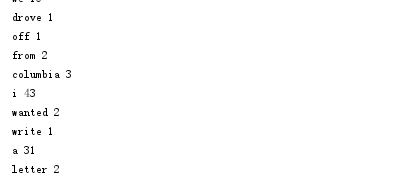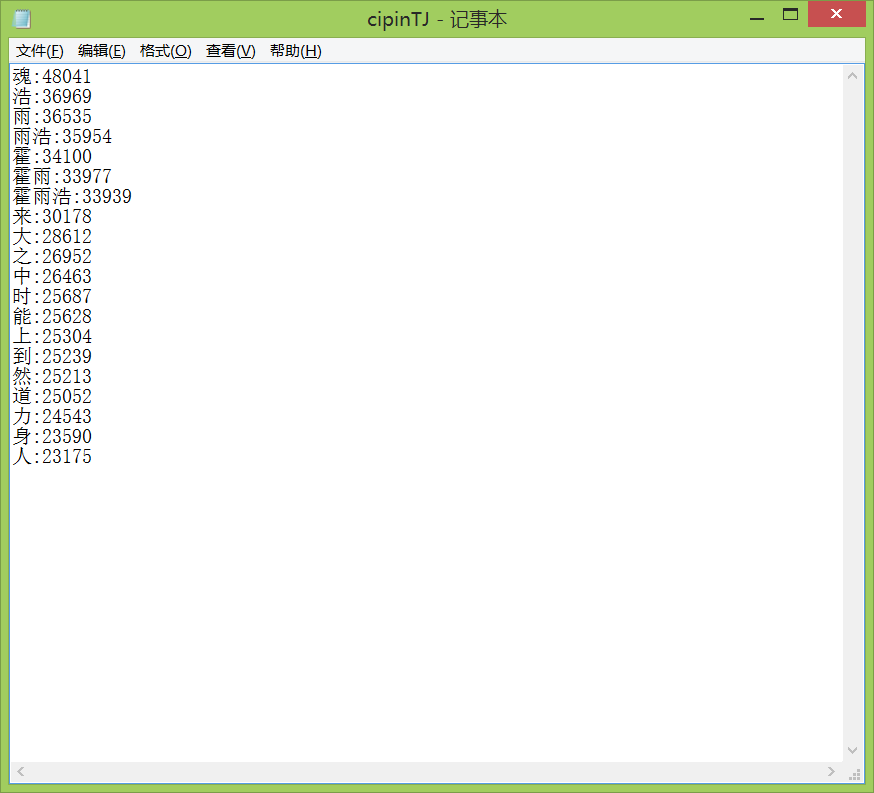1.下载一首英文的歌词或文章
将所有,.?!’:等分隔符全部替换为空格
将所有大写转换为小写
生成单词列表
生成词频统计
排序
排除语法型词汇,代词、冠词、连词
输出词频最大TOP20
将分析对象存为utf-8编码的文件,通过文件读取的方式获得词频分析内容。
fo = open('news.txt','r')
news = fo.read()
fo.close()
sep = ''',.!?'":;()'''
exclude = {'to','and','the','that','in','for','of'}
for c in sep:
news = news.replace(c,' ')
wordList = news.lower().split()
wordDict = {}
for w in wordList:
wordDict[w] = wordDict.get(w,0)+1
for w in exclude:
del(wordDict[w])
#
# #方法二
# wordSet = set(wordList)
# for w in wordSet:
# wordDict[w] = wordList.count(w)
dictList = list(wordDict.items())
dictList.sort(key=lambda x: x[1],reverse=True)
for i in range(20):
print(dictList[i])
#输出所有词频
for w in wordDict:
print(w,wordDict[w])
运行结果:


2.中文词频统计
下载一长篇中文文章。
从文件读取待分析文本。
news = open('gzccnews.txt','r',encoding = 'utf-8')
安装与使用jieba进行中文分词。
pip install jieba
import jieba
list(jieba.lcut(news))
生成词频统计
排序
排除语法型词汇,代词、冠词、连词
输出词频最大TOP20(或把结果存放到文件里)
import jieba
#获取文件
fo = open('jueshi.txt', 'r', encoding='utf-8')
file = fo.read()
fo.close();
#排除空格,代词,连词
str1 = ''',。‘’“”:;()!?、··· '''
dele = {' ','
','u3000','的','和','在','是','你','我','他','她','们','了','这','给','又','个','那','里',
'不','就','着','一','也','都', '者', '有', '出','而','了'}
jieba.add_word('唐门')
jieba.add_word('魂师')
jieba.add_word('武魂')
jieba.add_word('魂导器')
for c in str1:
file = file.replace(c, ' ')
tempwords = list(jieba.cut(file))
count = {}
words = list(set(tempwords) - dele)
for i in range(0, len(words)):
count[words[i]] = file.count(str(words[i]))
countList = list(count.items())
countList.sort(key=lambda x: x[1], reverse=True)
print(countList)
#把结果存到文件夹
fo = open('F:cipinTJ.txt', 'a', encoding='utf-8')
for i in range(20):
fo.write(countList[i][0] + ':' + str(countList[i][1]) + '
')
fo.close()
统计结果:
